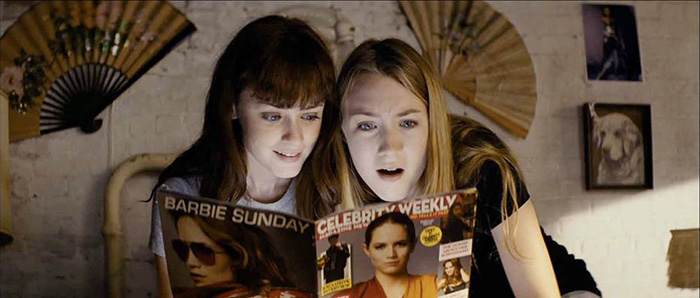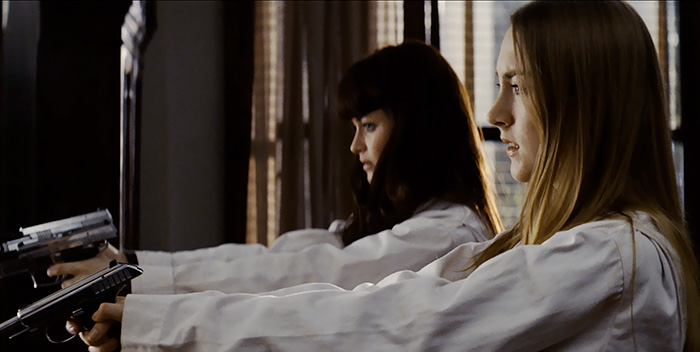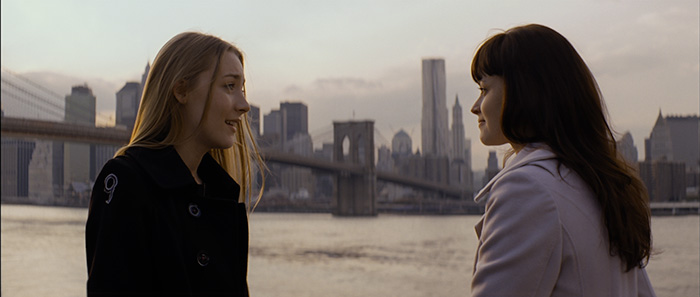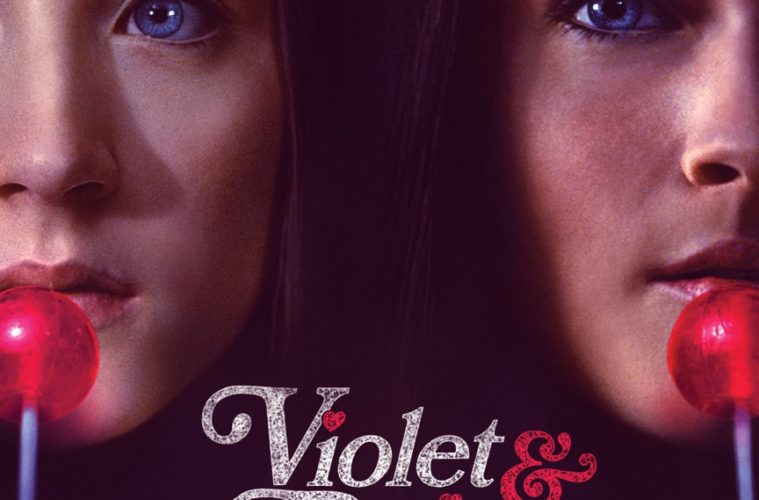Just because you’re an assassin doesn’t mean you can’t still be a girl too. The titular Violet (Alexis Bledel) and Daisy (Saoirse Ronan) don’t let their work get in the way of gossip, pop music, laughter, or dance. Murder is simply a way to pay the rent and retain some semblance of the childhood young women their age should have. They make a great team and provide a service with the same amount of detachment as any other. Each victim is a statistic deserving his/her end for one reason or another. Sure they could sit at bank or a law office helping to foreclose on homes, decline loans, and put innocents away on technicalities. But if ruining lives is your game, why not go all the way? Like Vi says, killing sure beats data entry.

While the gum chewing and yo-yo rolling doesn’t quite instill confidence in their work, they prove to be consummate professionals—the eighth and ninth best hit-women on their boss Chet’s payroll to be exact. But is that all these girls are? What about their families? What about friends? Why is it that when they discover the Barbie Sunday (Cody Horn) concert they hoped to attend is canceled does Violet’s declaration of “I’ll think of something” lead them into a Quentin Tarantino-like scene of contract killing while dressed as pizza-delivering nuns telling jokes with meticulously deliberate cadence, expressions, and timing? Has the disappointment of not seeing their idol turned them into murderers for no reason other then needing something to pass the time? What is Violet & Daisy truly about?
Answering this last question is the key to measuring your enjoyment level because Geoffrey Fletcher’s directorial debut is far more involving than its surface admits. A contemporary fable dealing with life, death, grief, and forgiveness, the subject matter’s constant ability to subvert gender and age relationships can’t help but earn laughter from its many situations of absurdity. However, just because it’s fun to witness two attractive pixies mow down a group of armed men without flinching before settling down to birthday cupcakes at a table with a stuffed panda doesn’t mean we should dismiss it as stylishly hollow humor. We should instead be questioning this particular aesthetic choice. It drips with so much artifice that there has to be reason. You don’t name every female assassin after a flower if you’re concerned with face value.
So, while the synopsis describes the central conceit nicely—two teenage killers take an easy job that turns into an introspective experience of philosophical musings and pathos—it isn’t enough to satisfy those truly captivated by what’s onscreen. Despite a wealth of contrived cuteness that could understandably force many to simply walk away shaking their heads, audience members are asked to forgive its blatant plot devices in order to witness the aftermath. Similar to Ronan’s Daisy, the film’s desire to let its killers fall asleep on the job without recourse or allow their mark (a fantastically nuanced James Gandolfini) to extend his life by baking cookies is in itself extremely naïve. It’s therefore our decision whether or not to label such preciousness as the misguided work of a novice or the careful calculations of an astute artist.

To be honest, I may have misinterpreted Violet & Daisy to be an eccentric misfire if not for the man behind it. The fact writer/director Fletcher was the Oscar-winning screenwriter of Precious made me wonder whether I missed something. What did the cryptic exchanges between Daisy and Chet’s number one assassin (Marianne Jean-Baptiste) mean? Why does Violet see and hear an airplane above her head when only clouds exist? What about the numbers on the girls’ shoulders, above the seemingly unnecessary chapter names, and on the hopscotch court subconsciously melding together? And that weirdly surreal dream of plane crashes, flight attendants, and the mysterious Rose; not to mention Vi’s tattoo or a doll lying a flight above Gandolfini’s apartment to match one in the dream? I couldn’t shake a sinister feeling beneath it all.
Reality and fantasy mix, allowing Fletcher to infuse the proceedings with a dark whimsy. He orchestrates everything as though glimpsing into the mind of a young girl trapped by societal pressures and unspeakable horrors, unable to get her head above water. Violet is a crazed, reactionary force immortally stuck within a dream free from consequence. Daisy is the innocent Daddy’s girl wanting to be loved and accepted, kind-hearted and sheltered from the horrific outside world she’s unwittingly entered. Jean-Baptiste’s #1 is the professional, career-oriented ideal while Barbie Sunday is the idol whose talent starts and ends with superficiality. And April (Tatiana Maslany)—Gandolfini’s estranged daughter—is the one wrestling with the future, stubborn and sorry in her rebellious isolation.
The poppy sheen of dance parties atop bodies oozing blood, miraculous stories of surviving a shootout unscathed, and earning revenge against violent monsters are coping mechanisms manifested to accept the inescapable tragedy of death, abuse, and abandonment. Or maybe I’ve read way too much into it and completely blew Fletcher’s sugary take on the brutality of homicide out of proportion. Perhaps it was all an exercise in transforming the generically helpless feminine child into a pillar of strength and security while the stereotypical powerful men yearn for the love of those they let slip away. Only Fletcher knows. His work can exist on its own merits with quirky subject matter, witty dialogue, memorable performances, and a superb soundtrack, but I believe it also possesses a meaningful depth for those willing to look.

The generalization is that little girls play dolls while boys play guns; the feminine skewing towards an ideal of compassion as they bandage up the destruction wrought by the brutish masculine’s quest for victory. It’s crucial then to listen as Violet and Daisy remember how they naively worked in an idyllic doll hospital once. Barbie Sunday’s name now alludes to today’s highly sexualized children becoming playthings in the minds of vicious predators, human dolls posed and used until broken—the façade now cancelled. Picking up a gun would of course empower the victim just as meeting a surprisingly kind soul proves cathartically humanizing. Accordingly, Violet & Daisy packs a much bigger wallop than anticipated as its stylish appearance peels back to reveal the contemplative journey towards mending psychological trauma underneath.
Violet & Daisy opens in limited NYC & LA release on Friday, June 7th.

